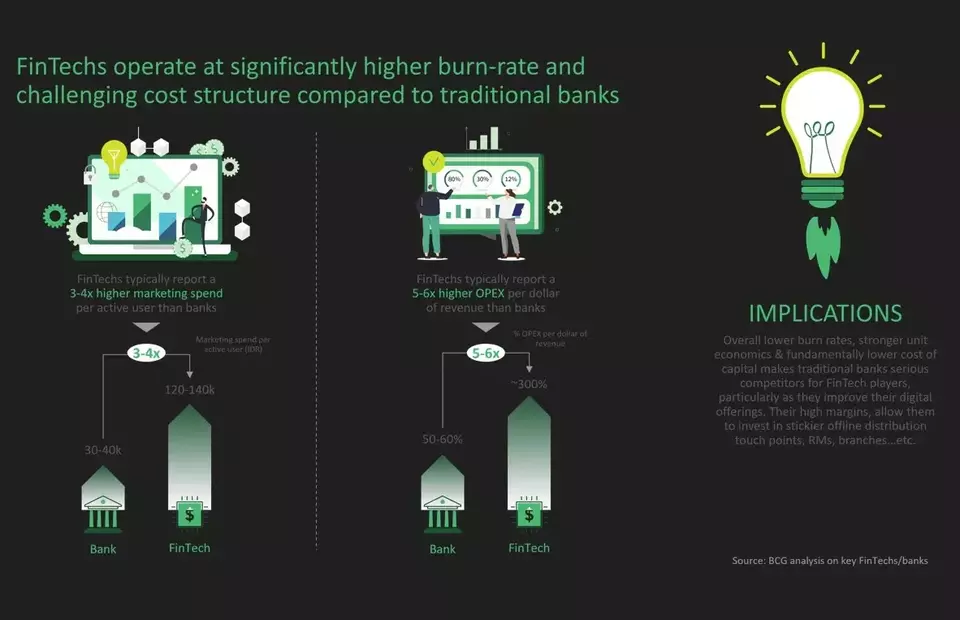Fintech has exploded in Indonesia in the past five years.
Enabled by widespread internet and smartphone penetration and supported by a progressive regulatory environment, a wave of new startups has emerged to address the needs of a large population that has historically had limited access to financial services.
Non-cash payment transaction volumes grew by 30 percent from 2016 to 2021 and are expected to increase by more than five times by 2031. In 2021, Indonesia had 785 fintech companies, making it Southeast Asia’s second largest fintech startup community, with 26 percent share of all fintech funding in the region, second only to Singapore.
Indonesia’s imminent rise as the world’s fourth largest consumer market by 2030 is driving investors’ appetite for the country’s fintech. But as market liquidity has reduced, the operating paradigm and expectations from fintech players are also changing.
Indonesia’s fintech startups have reported falling values between 50 and 90 percent in the past 12 months.
As we prepare to unveil, in collaboration with AC Ventures, our most comprehensive report yet on Indonesia’s fintech sector, we examine how changes in the global macroeconomic environment are affecting Indonesia’s fintech industry, how the competitive landscape is evolving, and what internal challenges the sector faces faces, especially when it comes to acquiring and retaining talent.
The three themes of profitability, competition and talent emerged from our survey of more than two thousand retail customers and SMEs about their financial product usage, fintech adoption and preferences, as well as in-depth interviews with over 60 fintech entrepreneurs, venture capitalists, and bankers in Indonesia.
This article explores these three critical themes in more detail.

A greater boost for profitability in the new investment paradigm
With the tightening of liquidity in the market, investors have shifted their focus from growth at all costs to profitability. This change is significant for startups that are seeking or have secured funding from institutional investors.
Investors are now paying more attention to a company’s overall profitability rather than just its unit economics, which has led to a greater emphasis on metrics such as longevity
value per customer (LTV), customer acquisition cost (CAC) and retention rates.
As a result, startups need to adapt the way they run their business.
For early-stage startups, this means that the runway for realizing the product-market fit will be shorter. They need to be much more thoughtful, practical and oriented towards income generation from the start.
Meanwhile, later-stage fintechs must rethink both their product and marketing strategies. Product diversification and cheaper acquisition and storage will be crucial to realizing better unit economics.
Startups must establish cost-effective approaches to customer acquisition and focus on high-value customers. Leveraging the broader ecosystem, primarily through partnerships, will be particularly important to allow for lower cost expansion while facilitating the transition to higher margin products and diversifying product lines.
They must optimize their distribution models beyond digital channels and establish cost-effective routes to customers to compete with larger players such as banks and financial institutions.
Competitive landscape, characterized by increasing competition from fintechs as well as entry from larger players
Even as investors’ expectations evolve, fintechs also face increasing competition. In a fast growing market like Indonesia, customer loyalty is still low and customers have a wide variety of offers.
For most fintech offerings in the market, there are now at least two or three startups competing in the same space.
Indonesia’s fintechs face competition from three sources – vertical-specific fintechs offering the same services, established non-financial services technology companies expanding into the fintech space, and traditional banks looking to offer fintech solutions.
In the fintech space, larger technology companies such as Grab, Shopee, GoTo and Bukalapak have a distinct advantage in having established ecosystems and captive user bases, as well as their financial resources, which can drive rapid expansion.
Traditional banks also have significant resources at their disposal and are increasingly investing in fintech propositions, including direct-to-consumer (D2C) digital product lines across lending, payments, savings, wealth and insurance.
They also have the advantage of lower capital costs (and higher margins) and offline presence, both of which are likely to enable rapid adoption.
As competition intensifies, fintech companies must redouble their efforts to strengthen their unique value proposition compared to larger technology firms. A greater focus on financial services will probably help them in the short to medium term, compared to non-financial services entering the market.
However, this advantage must be reinforced through rapid product and distribution innovation.
Winning the talent game will only become increasingly important
In Indonesia, hiring and retaining specialized technology talent is a challenge. The country needs an estimated 9 million tech talents by 2030 to support its burgeoning digital economy. In 2021, it was valued at $70 billion, the highest among ASEAN countries, and projected to increase to $330 billion by 2030.
President Joko “Jokowi” Widodo’s administration is now focusing on expanding the digital ecosystem, especially developing digital talent and infrastructure through various ICT policies.
While this is likely to increase talent availability in the medium term, in the short term startups will need to use a mix of talent management practices and leverage offshore talent (where necessary) to meet their needs.
The talent shortage is particularly likely to have a significant impact on hiring for specialist roles and recruiting senior managers. Hiring specialized talent, particularly in risk, artificial intelligence and machine learning, will continue to be challenging.
In the same way, internal management and senior management roles will continue to be challenging.
The next 12 to 24 months will remain bumpy for most fintechs in Indonesia unless they radically adapt their business models. But with 47 million Indonesians still underbanked, and 92 million adults unbanked, Indonesia’s fintech opportunity remains huge.
These lanes give the country’s fintech viable opportunities to be ahead of the game and become catalysts in Indonesia’s push for financial inclusion en masse in the coming decade.
Sumit Kumar is a Managing Director and Partner at Boston Consulting Group. Shobhit Shubhankar is a project manager at Boston Consulting Group.

























